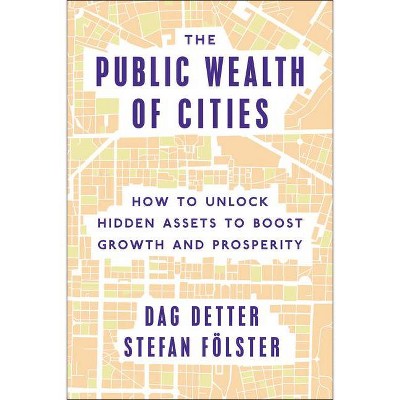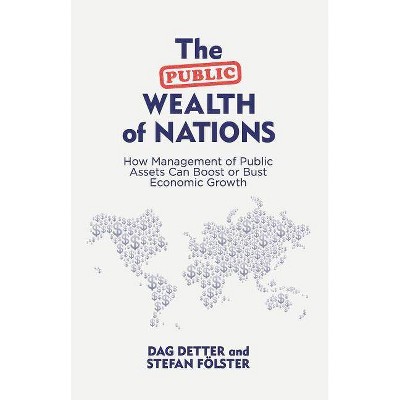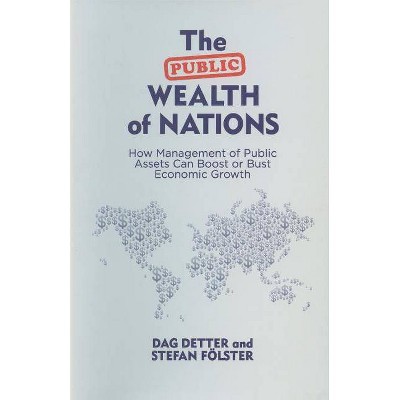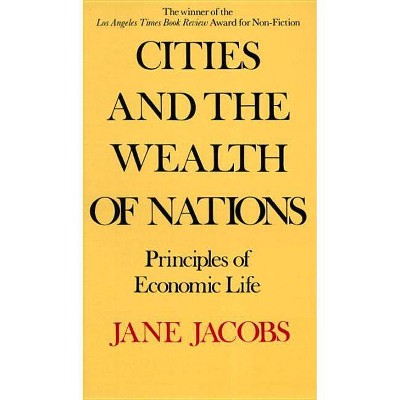The Public Wealth of Cities - by Dag Detter & Stefan Fölster (Hardcover)

Similar Products
Products of same category from the store
AllProduct info
<p/><br></br><p><b> Book Synopsis </b></p></br></br><p><b>How to leverage existing resources to meet the current and future needs of cities</b></p><p>Crumbling streets and bridges. Poorly performing schools and inadequate social services. These are common complaints in cities, which too often struggle just to keep the lights on, much less make the long-term investments necessary for future generations.</p><p>It doesn't have to be this way. This book by two internationally recognized experts in public finance describes a new way of restoring economic vitality and financial stability to cities, using steps that already have been proven remarkably successful. The key is unlocking social, human, and economic wealth that cities already own but is out of sight--or "hidden." A focus on existing public wealth helps to shift attention and resources from short-term spending to longer-term investments that can vastly raise the quality of life for many generations of urban residents.</p><p>A crucial first step is to understand a city's balance sheet--too few cities comprehend how valuable a working tool this can be. With this in hand, taxpayers, politicians, and investors can better recognize the long-term consequences of political decisions and make choices that mobilize real returns rather than rely on more taxes, debt, or austerity.</p><p>Another hidden asset is real estate. Even poor cities own large swathes of poorly utilized land, or they control underperforming utilities and other commercial assets. Most cities could more than double their investments with smarter use of these commercial assets. Managing the city's assets smartly through the authors' proposed Urban Wealth Funds--at arm's-length from short-term political influence--will enable cities to ramp up much needed infrastructure investments.</p><p/><br></br><p><b> From the Back Cover </b></p></br></br><p><b>The authors of <i>The Public Wealth of Nations</i> (listed among the Best Books of the Year 2015 by <i>The Economist</i> and <i>The Financial Times</i>) reveal how cities can use under performing assets to ramp up their much-needed investments.</b></p><p>Crumbling streets and bridges. Poorly performing schools. Inadequate social services. These are common complaints in cities, which too often struggle just to keep the lights on, much less make the long-term investments necessary for future generations.</p><p>It doesn't have to be this way. In <i>The Public Wealth of Cities</i>, two experts in public finance describe a simple but compelling blueprint to restore economic vitality and financial stability to cities by taking steps that already have proved remarkably successful. The key is to unlock social, human, and economic wealth that cities already own but is out of sight. A focus on existing public wealth helps to shift attention and resources from short-term spending to longer-term investments that can dramatically raise the quality of life for urban residents.</p><p>A crucial first step is to understand a city's balance sheet--too few cities comprehend how valuable a working tool this can be. With this previously hidden asset in hand, taxpayers, politicians, and investors can better recognize the long-term consequences of political decisions and make choices that mobilize real returns rather than rely on more taxes, debt, or austerity.</p><p>Even poor cities own large swathes of real estate and control underperforming utilities and other commercial assets. Most cities could more than double their investments with a more professional approach to these assets. Managing them smartly through the authors' proposed Urban Wealth Funds--at arm's-length from short-term political influence--will enable cities to create the conditions for essential long-term investment.</p><p/><br></br><p><b> Review Quotes </b></p></br></br><br><p>"Across the globe, people are flocking to cities. But some cities are thriving and others aren't. As the process of urbanization continues, it's crucial to understand why some cities succeed and others don't. In this important and practical new book, Detter and Fölster teach us how to turn around distressed cities."--Peter Orszag, Vice Chairman of Investment Banking, Lazard, and former Director, Congressional Budget Office</p><br><br><p>"Cities are the locomotives of economic progress. But not all cities are successful. This fascinating and important book has divided them into the "treadmill towns" that fail and the "turbo-cities" that succeed. The difference, argue the authors, is that successful cities focus intelligently on developing their long-term assets. They build economic, social, and human wealth."--Martin Wolf, <i>Financial Times</i></p><br><br><p>"Drawing on the successes and failures of cities around the world and applying exemplary analysis, Detter and Fölster uncover a treasure trove of hidden urban assets. Transparent, accountable, and professional governance of the economic, social, and human assets of our cities is achievable. A must-read for all mayors, city counsellors and those who elect them."--Willem Buiter, Chief Economist, Citibank</p><br><br><p>"How do we deploy our public assets--our balance sheet--to meet critical social, human, and economic challenges? How do we move beyond the essential--unassailable accountability--to our ultimate goal, expanding our metro economic engines? Detter and Fölster take the lessons from their earlier work and apply them at the local level, where creativity and innovation are essential and where both the potential promise and pitfalls of government action are in stark relief."--Anthony Williams, Executive Director, Federal City Council, and former Mayor, Washington, D.C.</p><br><br><p>"In terms of the ideas presented, I loved the book. It touches on the organizational challenges of getting municipal finance right while speaking to what execution has to look like as well. It also moves us beyond a discussion limited to taxation and into a conversation about how municipal authorities can claw back some of the value they create, the same as we'd expect any firm in the private sector to do; and in so doing, it offers sustainable ways to fund those functions that won't make money, but that we'd like to see supported all the same."--Jeff Fong, Market Urbanism</p><br><br><p>"The authors offer pragmatic solutions, linking better outcomes to asset management practices and new definitions of social capital that promote evidence-based investments. The strategy: identify your economic, social, and human assets; professionally manage assets; and instead of showcasing current interests or putting out fires, make long-term investments. <i>The Public Wealth of Cities</i> helps local leaders see our real responsibility: not to produce and manage public wealth but to advocate for residents served by it. Of course, money matters, but not as much as our will to collaborate across sectors in order to govern public resources well and improve lives."--Ben McAdams, Salt Lake County (Utah) Mayor</p><br><br><p>"This is an important book. As the world's population grows, some cities will be forced to adapt while others will founder. Identifying a city's assets, improving management, and shifting resources from consumption to long-term investment make inherent sense and warrant close attention as a means to improve the quality of city life and standards of living."--Fergus J. McCormick, Chief Economist, DBRS Rating Inc</p><br><p/><br></br><p><b> About the Author </b></p></br></br><p><b>Dag Detter</b> is Managing Director of Detter & Co, specializing in unlocking public wealth. Previously he was the President of Stattum, the Swedish government holding company, and Director of State Enterprises at the Ministry of Industry.</p><p><b>Stefan Fölster</b> is Director of the Reform Institute in Sweden and Associate Professor of economics at the Royal Institute of Technology, in Stockholm. He has been the chief economist at the Confederation of Swedish Enterprise, and the author of many books on economic growth and social developments.</p><p>Detter and Fölster are the authors of <i>The Public Wealth of Nations</i>, named by both <i>The Economist</i> and <i>The Financial Times</i> as among the best books of 2015.</p>
Price History
Cheapest price in the interval: 29.99 on October 27, 2021
Most expensive price in the interval: 29.99 on November 8, 2021
Price Archive shows prices from various stores, lets you see history and find the cheapest. There is no actual sale on the website. For all support, inquiry and suggestion messagescommunication@pricearchive.us




















